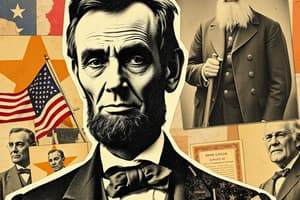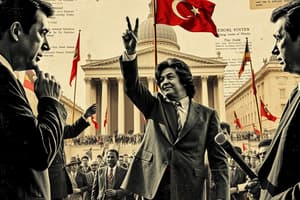Podcast
Questions and Answers
Why does Lyngdoh Madam believe that definitions are necessary?
Why does Lyngdoh Madam believe that definitions are necessary?
Definitions are necessary when there is difficulty in using a word, as they help distinguish one term from another.
What is Merry's main concern about discussing democracy before its definition?
What is Merry's main concern about discussing democracy before its definition?
Merry is concerned that discussing democracy without understanding its definition may lead to confusion and misunderstanding.
How does Lyngdoh Madam counter Merry's argument about understanding words?
How does Lyngdoh Madam counter Merry's argument about understanding words?
Lyngdoh Madam explains that people commonly use words without waiting for a definition, indicating that meaning evolves through usage.
In what ways has the use of computers shifted over time according to the dialogue?
In what ways has the use of computers shifted over time according to the dialogue?
What example does Lyngdoh Madam give to explain the necessity of having definitions?
What example does Lyngdoh Madam give to explain the necessity of having definitions?
What does Merry suggest about the approach to defining words?
What does Merry suggest about the approach to defining words?
What underlying concept about language does the dialogue illustrate?
What underlying concept about language does the dialogue illustrate?
What is a fundamental requirement for a government to be considered democratic?
What is a fundamental requirement for a government to be considered democratic?
Why is it necessary for the state to respect basic rights of citizens?
Why is it necessary for the state to respect basic rights of citizens?
What role do independent newspapers play in a democracy?
What role do independent newspapers play in a democracy?
What was the impact of the law limiting criticism of the President in Zimbabwe?
What was the impact of the law limiting criticism of the President in Zimbabwe?
How does an independent judiciary contribute to the protection of citizens' rights?
How does an independent judiciary contribute to the protection of citizens' rights?
In what way does government control of media affect democracy?
In what way does government control of media affect democracy?
What does it mean for everyone to be equal in the eyes of the law?
What does it mean for everyone to be equal in the eyes of the law?
What is meant by 'taking political actions' in the context of citizens' rights?
What is meant by 'taking political actions' in the context of citizens' rights?
Why is it significant to discuss incidents in other countries, such as Zimbabwe?
Why is it significant to discuss incidents in other countries, such as Zimbabwe?
What significant claim about democracies is presented in the content?
What significant claim about democracies is presented in the content?
What was Rajesh's perspective on the argument for democracy regarding war?
What was Rajesh's perspective on the argument for democracy regarding war?
How did Muzaffar respond to Rajesh's viewpoint?
How did Muzaffar respond to Rajesh's viewpoint?
What is the most common form of democracy mentioned?
What is the most common form of democracy mentioned?
Why is it considered impossible for all citizens to make decisions together in modern democracies?
Why is it considered impossible for all citizens to make decisions together in modern democracies?
What do modern democracies require due to the impracticality of direct participation?
What do modern democracies require due to the impracticality of direct participation?
What role do citizens have in decision-making in a representative democracy?
What role do citizens have in decision-making in a representative democracy?
How does defining democracy help in understanding its features?
How does defining democracy help in understanding its features?
According to the content, what is necessary for identifying minimal democratic features?
According to the content, what is necessary for identifying minimal democratic features?
What does the content suggest about the relationship between democracy and war?
What does the content suggest about the relationship between democracy and war?
What is one key difference between democratic and undemocratic governments based on citizen participation?
What is one key difference between democratic and undemocratic governments based on citizen participation?
How does the concept of 'constant effort' relate to the realization of democratic ideals?
How does the concept of 'constant effort' relate to the realization of democratic ideals?
In which scenarios would a country's government be classified as 'undemocratic'?
In which scenarios would a country's government be classified as 'undemocratic'?
Why is the study of democratic politics essential in understanding a country's democracy?
Why is the study of democratic politics essential in understanding a country's democracy?
What implication does a lack of an independent election commission have on a country's democracy?
What implication does a lack of an independent election commission have on a country's democracy?
What is a key principle of democratic decision-making?
What is a key principle of democratic decision-making?
How does democracy provide an equal say to individuals?
How does democracy provide an equal say to individuals?
What is the most common form of democracy today?
What is the most common form of democracy today?
In what scenario might direct decision-making be applied in a democracy?
In what scenario might direct decision-making be applied in a democracy?
What ideal standard does the concept of democracy aim to establish?
What ideal standard does the concept of democracy aim to establish?
What is one of the essential requirements for equal citizen participation in democracy?
What is one of the essential requirements for equal citizen participation in democracy?
What does the quote about true democracy imply?
What does the quote about true democracy imply?
Why might a country never be seen as a perfect democracy?
Why might a country never be seen as a perfect democracy?
How can citizens meaningfully engage in democratic discussions?
How can citizens meaningfully engage in democratic discussions?
What inquiry is proposed regarding voter engagement in local constituencies?
What inquiry is proposed regarding voter engagement in local constituencies?
Flashcards
Dynamic Definition
Dynamic Definition
The process of understanding the meaning of a word through its use and evolving its definition.
Defining Purpose
Defining Purpose
The practice of defining a word only when there's confusion or ambiguity in its usage.
Word Meaning from Usage
Word Meaning from Usage
The belief that the meaning of a word comes from its application and use rather than a fixed definition.
Changing Word Meaning
Changing Word Meaning
Signup and view all the flashcards
Active Thinking
Active Thinking
Signup and view all the flashcards
Defining Everyday Words
Defining Everyday Words
Signup and view all the flashcards
Evolving Understanding
Evolving Understanding
Signup and view all the flashcards
Democracy
Democracy
Signup and view all the flashcards
Elected government
Elected government
Signup and view all the flashcards
Freedom of Speech
Freedom of Speech
Signup and view all the flashcards
Freedom of Association
Freedom of Association
Signup and view all the flashcards
Freedom to Protest
Freedom to Protest
Signup and view all the flashcards
Equality before the Law
Equality before the Law
Signup and view all the flashcards
Independent Judiciary
Independent Judiciary
Signup and view all the flashcards
Conditions for Democratic Governance
Conditions for Democratic Governance
Signup and view all the flashcards
Independent Media
Independent Media
Signup and view all the flashcards
Representative Democracy
Representative Democracy
Signup and view all the flashcards
Majority Rule, Minority Rights
Majority Rule, Minority Rights
Signup and view all the flashcards
Government Accountability
Government Accountability
Signup and view all the flashcards
Citizen Participation
Citizen Participation
Signup and view all the flashcards
Democratic Peace Theory
Democratic Peace Theory
Signup and view all the flashcards
Collective Decision-Making
Collective Decision-Making
Signup and view all the flashcards
Conflict Resolution in Democracies
Conflict Resolution in Democracies
Signup and view all the flashcards
Future War Between Democracies?
Future War Between Democracies?
Signup and view all the flashcards
Internal Features of Democracies
Internal Features of Democracies
Signup and view all the flashcards
Dictatorship
Dictatorship
Signup and view all the flashcards
One-party rule
One-party rule
Signup and view all the flashcards
Monarchy
Monarchy
Signup and view all the flashcards
Political participation
Political participation
Signup and view all the flashcards
What is democracy?
What is democracy?
Signup and view all the flashcards
Direct Democracy
Direct Democracy
Signup and view all the flashcards
Consultation and Consent
Consultation and Consent
Signup and view all the flashcards
Ideal Democracy
Ideal Democracy
Signup and view all the flashcards
What does true democracy require?
What does true democracy require?
Signup and view all the flashcards
Imperfect Democracies
Imperfect Democracies
Signup and view all the flashcards
Rational Decision Making
Rational Decision Making
Signup and view all the flashcards
What is rationalization?
What is rationalization?
Signup and view all the flashcards
Evaluating a democracy
Evaluating a democracy
Signup and view all the flashcards
Study Notes
Overview of Chapter 1
- This chapter introduces the concept and features of democracy.
- It defines democracy as a form of government where rulers are elected by the people.
- It distinguishes democratic governments from non-democratic ones.
- It explores the reasons why democracy is the prevalent form of government today.
What is Democracy?
- Democracy originates from Greek words "demos" (people) and "kratia" (rule).
- Thus, democracy signifies rule by the people.
- Defining democracy necessitates understanding words like pen, rain, and love.
- These words' meanings evolve over time.
Defining Democracy
- The rulers in a democracy are elected by the people.
- Unlike dictatorships or monarchies, the people choose their leaders.
- Elected rulers must adhere to constitutional limits and citizen's rights.
- Elections must offer a genuine choice among various political options.
Components of a Democratic Government
- Free and fair elections.
- A representative system allowing all people to participate without discrimination.
- A constitution that guides the elected representatives and protects people's fundamental rights.
- An independent judiciary upholding the constitution.
Why Democracy?
- Citizens' participation in decision-making.
- Better allocation of resources.
- Less corruption.
- Opportunity for all to address their issues.
- Protection of individual rights.
- Rule of law.
Arguments Against Democracy
- Instability due to frequent changes in leadership.
- Potential for political competition to hinder decision-making.
- Inefficiency due to many people involved in decision-making.
- Difficulties in decision-making due to conflicts between various groups' needs.
- Potential for poor decisions from elected officials.
- Possibility of corruption in systems based on electoral competition.
- Ordinary citizens' lack of adequate knowledge to make political choices.
Arguments in Favour of Democracy
- Greater accountability of leaders to citizens.
- Emphasis on addressing different groups' needs.
- Protection of civil liberties.
- Opportunity for correcting wrong decisions.
- Higher regard for every citizen's rights and entitlements.
- Fosters stability and peaceful coexistence of diverse groups.
Studying That Suits You
Use AI to generate personalized quizzes and flashcards to suit your learning preferences.




